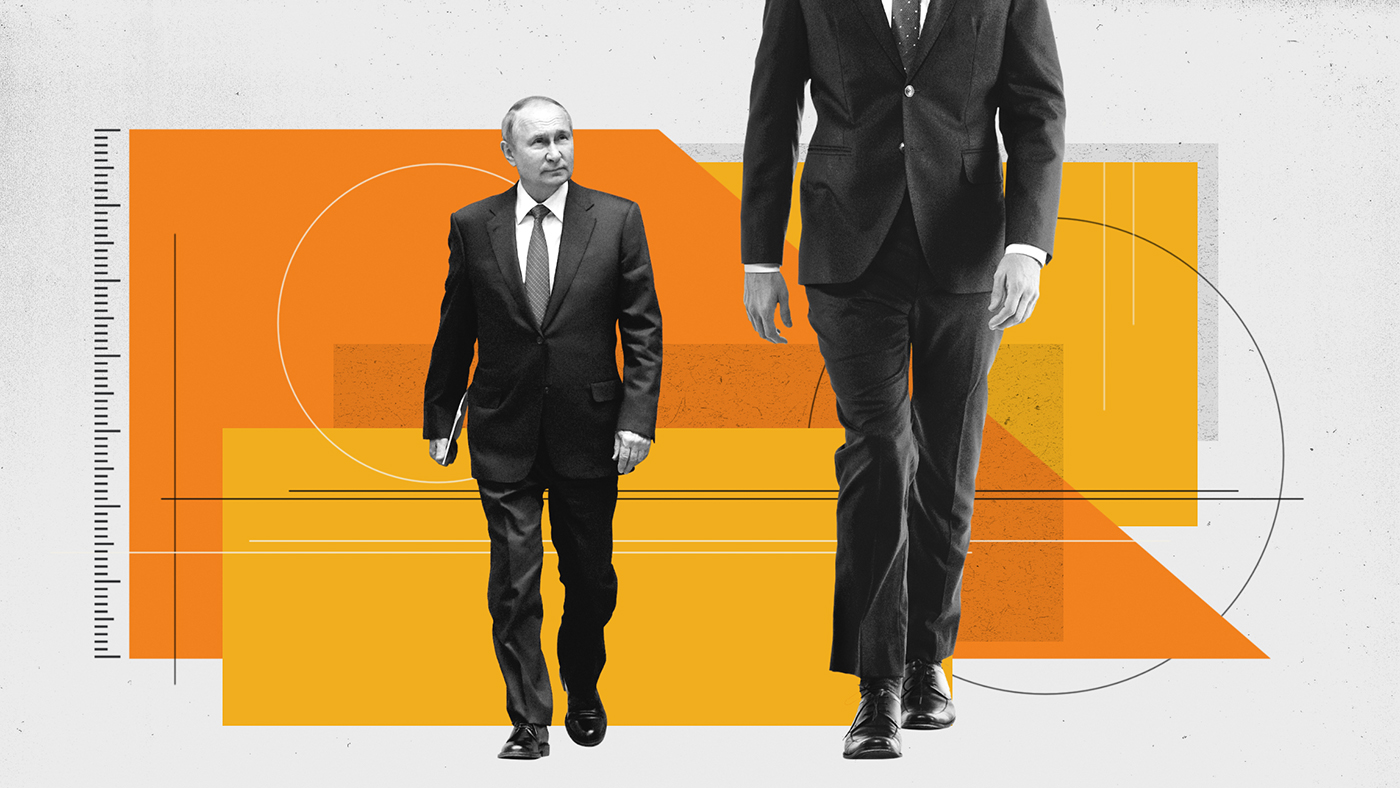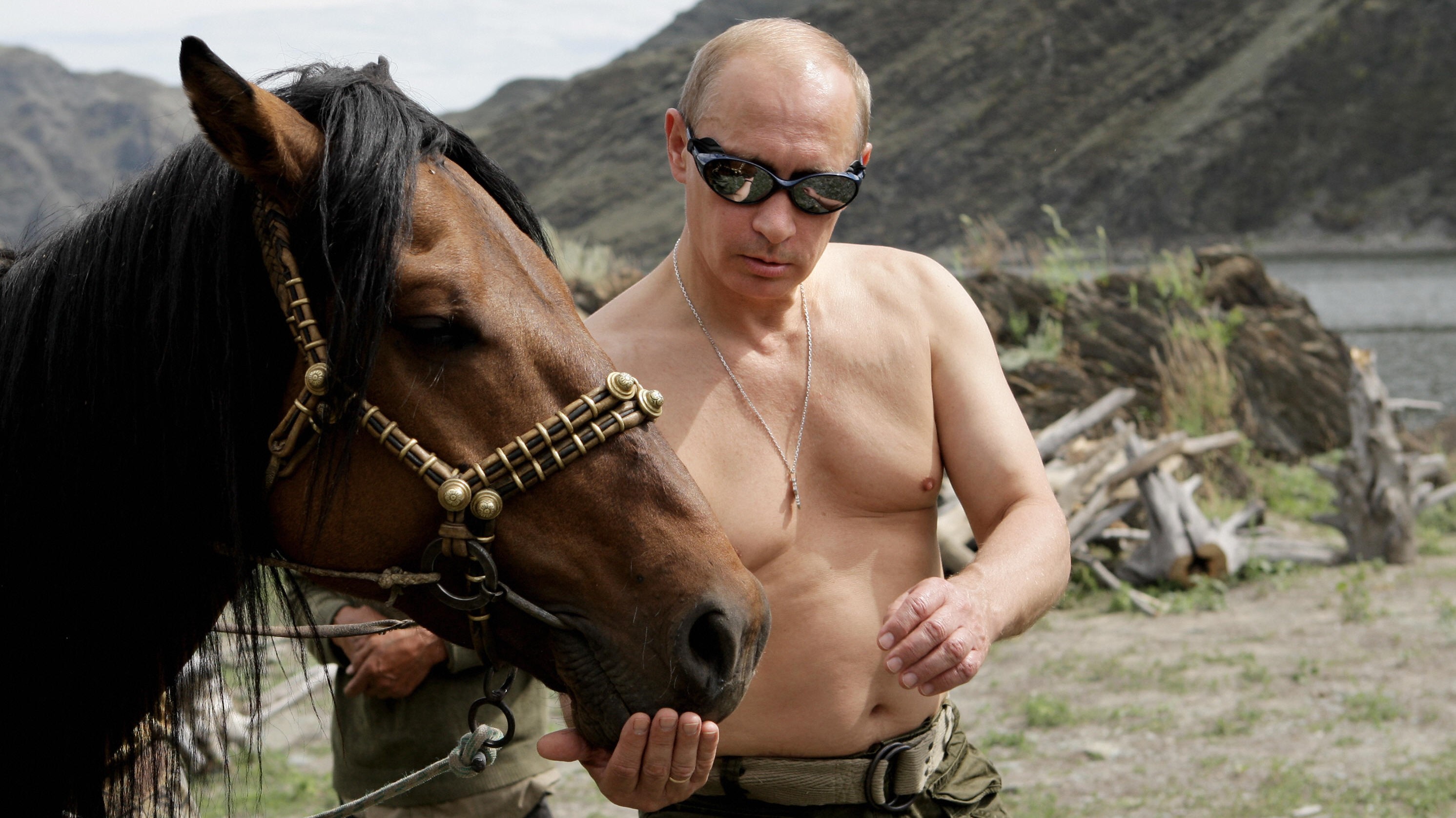Vladimir Putin and the rise of the 'short kings'
Critics suggest Russian president has 'Napoleon complex' but other top world leaders share his stature

A free daily email with the biggest news stories of the day – and the best features from TheWeek.com
You are now subscribed
Your newsletter sign-up was successful
Donald Trump was quick to make his height advantage shown during last week's in-person meeting with Vladimir Putin.
Greeting him at the plane, the US president towered over his Russian counterpart, using his assertive handshake as a "status reminder" and "his way of telling Putin that he's the man in charge", body language expert Dr Peter Collett told Sky News.
Once seated, however, it was Putin who appeared more dominant, spreading his legs and adopting a more aggressive posture. "In spite of their difference in height, Putin, although he's very short, sits upright, ramrod, looking very confident, whereas poor old Trump is crumpled and turned inwards," he said.
The Week
Escape your echo chamber. Get the facts behind the news, plus analysis from multiple perspectives.

Sign up for The Week's Free Newsletters
From our morning news briefing to a weekly Good News Newsletter, get the best of The Week delivered directly to your inbox.
From our morning news briefing to a weekly Good News Newsletter, get the best of The Week delivered directly to your inbox.
Accusations that the former KGB officer suffers from a "Napoleon complex" – acting aggressively in an attempt to compensate for his physical stature – might be "overly simplistic and potentially problematic", psychologist Emma Kenny told The Sun. Yet it is true that "height can play into how a leader is perceived, especially when they're interacting with taller counterparts on the international stage".
Does Putin have a complex about his height?
To understand why his height deserves attention, "one has to understand the significance of Putin's cult of personality in cementing his rule", said the Kyiv Post.
Over the years Putin has sought to portray a tough-guy image in a series of infamous photoshoots, but "even the best publicity stunts cannot alter reality – or in this case, Putin's average height".
He is "famously self-conscious about his height", said the Daily Express, which reported that the Russian premier was left "red-faced" in 2015 when aides forgot to tell a group of women invited to the Kremlin not to wear high heels, leaving several of the guests "towering over" him.
A free daily email with the biggest news stories of the day – and the best features from TheWeek.com
He is officially 5ft 7in tall, but the paper estimated he could in fact be as short as 5ft 2in. During the recent Alaska summit between Putin and Trump, "it was the noticeable height difference between the two leaders that stole the internet's attention, reigniting debate over the Russian leader's true stature", said The Economic Times.
Like his North Korean counterpart, Kim Jong Un, Putin has been photographed wearing heeled shoes to boost his elevation, and social media was again full of speculation he had used such lifts during his recent meeting with Trump.
The Russian leader's detractors abroad have also "seized on his size", said The Times.
In 2014, the Ukrainian oligarch Igor Kolomoisky described Putin as a "schizophrenic of short stature" for taking Russia and Ukraine to the brink of war. After Russia's full invasion began in 2022, the Tory MP Julian Lewis told the House of Commons that Putin was "firmly in the grip of small-man syndrome".

Putin poses with a horse during a holiday in Southern Siberia in 2009
How does Putin measure up to other leaders?
"World leaders don't always publicise their height, which means estimating often comes down to comparing them as they stand beside one another or with other celebrities whose heights are public," said Business Insider.
What is true is that Putin is in surprisingly similar company on the world stage.
Indian Prime Minister Narendra Modi and the Brazilian President Luiz Inácio Lula da Silva measure just over five-and-a-half feet, while French President Emmanuel Macron and Ukraine's Volodymyr Zelenskyy both stand between 5ft 6in and 5ft 7in. Standing at 5ft 3in tall, Italy's PM Giorgia Meloni – who is the same height as European Commission President Ursula von der Leyen – was awarded damages last year from an Italian journalist who made fun of her petite stature on social media.
Keir Starmer, at 5ft 8in, is half an inch taller than the global male average height. China's President Xi Jinping is slightly taller at 5ft 9in, "unusually tall" compared to the Chinese average and "the country's tallest leader for decades", said the Daily Express.
By contrast, Trump (6ft 2in, according to his driving licence, even though he claims to be 6ft 3in) and Serbia's hardline president Aleksandar Vucic (6ft 6in) are among the world's tallest power-players. Earlier this year they were joined by German Chancellor Friedrich Merz, who is also 6ft 6in. The title of world's tallest leader, however, goes to Albanian PM Edi Rama, who has an inch on his Serbian and German counterparts.
Does height actually matter?
"In politics, height matters," said The Economist in 2020. Not only are US presidents "becoming taller relative to average Americans" but research suggests that "long-limbed politicians outperform their stumpier rivals" in the polls because "taller people enjoy higher self-esteem, on average, and are perceived to be healthier, more intelligent and more authoritative."
Yet the idea that height is bound up with leadership and masculinity is "looking increasingly shaky" as older "notions of patriarchy wobble" and a "new generation of short kings rise", said The New World.
"Stature is a physical quality," said Maureen Dowd in The New York Times, "but, more important, it is a human and moral quality."
"We all – pundits, politicians, the public – should try to stifle the notion that tallness grants superiority and shortness is a shortcoming," wrote Gideon Lasco, professor of anthropology at the University of the Philippines, in Sapiens. "By participating in a politics of diminution, we diminish our politics."
-
 The Week contest: AI bellyaching
The Week contest: AI bellyachingPuzzles and Quizzes
-
 Political cartoons for February 18
Political cartoons for February 18Cartoons Wednesday’s political cartoons include the DOW, human replacement, and more
-
 The best music tours to book in 2026
The best music tours to book in 2026The Week Recommends Must-see live shows to catch this year from Lily Allen to Florence + The Machine
-
 Will increasing tensions with Iran boil over into war?
Will increasing tensions with Iran boil over into war?Today’s Big Question President Donald Trump has recently been threatening the country
-
 Corruption: The spy sheikh and the president
Corruption: The spy sheikh and the presidentFeature Trump is at the center of another scandal
-
 Putin’s shadow war
Putin’s shadow warFeature The Kremlin is waging a campaign of sabotage and subversion against Ukraine’s allies in the West
-
 Rubio boosts Orbán ahead of Hungary election
Rubio boosts Orbán ahead of Hungary electionSpeed Read Far-right nationalist Prime Minister Viktor Orbán is facing a tough re-election fight after many years in power
-
 Alexei Navalny and Russia’s history of poisonings
Alexei Navalny and Russia’s history of poisoningsThe Explainer ‘Precise’ and ‘deniable’, the Kremlin’s use of poison to silence critics has become a ’geopolitical signature flourish’
-
 Greenland’s capital becomes ground zero for the country’s diplomatic straits
Greenland’s capital becomes ground zero for the country’s diplomatic straitsIN THE SPOTLIGHT A flurry of new consular activity in Nuuk shows how important Greenland has become to Europeans’ anxiety about American imperialism
-
 What happens now that the US-Russia nuclear treaty is expiring?
What happens now that the US-Russia nuclear treaty is expiring?TODAY’S BIG QUESTION Weapons experts worry that the end of the New START treaty marks the beginning of a 21st-century atomic arms race
-
 Which way will Trump go on Iran?
Which way will Trump go on Iran?Today’s Big Question Diplomatic talks set to be held in Turkey on Friday, but failure to reach an agreement could have ‘terrible’ global ramifications